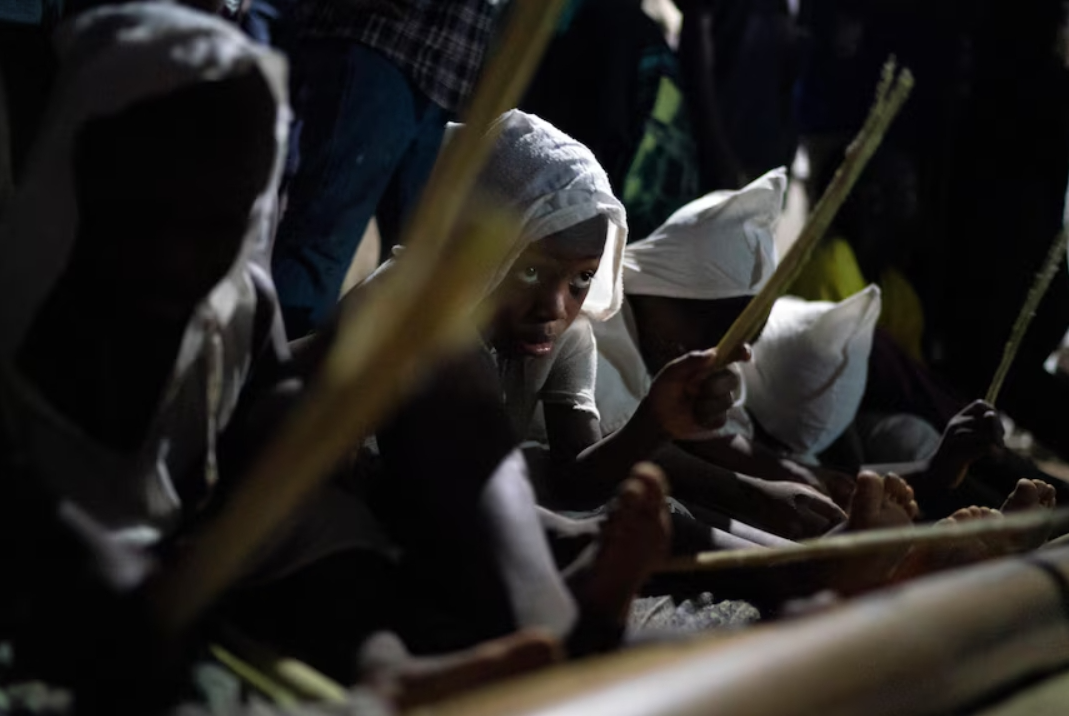Gambiaj.com – (BANJUL, The Gambia) – The words echoed through the quiet compound, stirring the morning air. Heartbeats quickened; breath held. This was no ordinary declaration—it marked the end of boyhood and the beginning of manhood: “You are no longer a boy.” We straightened instinctively, not from pride, but from reverence. The morning sun, the stillness, and the attention of those around us made it clear: everything had changed.
In the Mbarr, the sacred school of initiation, we sat before men who embodied discipline, honor, and wisdom. Mbye Saine, the presiding elder, called our names one by one, teaching that respect is earned as much through listening as through action. Around him were men whose lives spoke louder than words.
J.C. Fye (Dakaan), calm and deliberate, whose silent gaze could correct more than a thousand words. He taught patience and the power of observation, showing that a man’s wisdom is measured in his restraint as much as his action.
Lamin Njie (Mr. Man Jumbo Yerri), whose presence alone commanded attention. He taught that confidence without arrogance is the essence of leadership. Every gesture, every word carried authority tempered by care.
Bolong Njie (Laa), whose humor was gentle but piercing. He reminded us that dignity lies in wisdom and humility, and that laughter can be a lesson as powerful as discipline.
Napaj Jobe, a pillar of quiet strength, corrects missteps with a glance or a subtle remark, showing that courage and integrity often speak without words.
Saul Senghore of Grant Street, whose patience and measured actions taught that true bravery is found in deliberate, consistent deeds rather than in haste or loud display.
Ebou Njie Lahit, whose humor carried subtle lessons on humility and honor, reminding us that even the strongest men must remain approachable and grounded.
They did not teach through punishment. They taught through example. Every gaze, gesture, and word carried weight. The Mbarr was their classroom, and we were attentive students.
The days in seclusion were filled with lessons on patience, honor, and community responsibility. At the center of it all was a song—Domaa Yaan Sëgeen. In Wolof, the phrase means, “I am the child who comes to your initiation.”
It is a declaration of courage and acceptance of guidance, acknowledging the authority of elders and the community. Every note, every word reminded us that manhood is not a private achievement; it is a covenant with family, community, and history itself.
Before you lead, greet. Before recognition, acknowledge others. Protect, never provoke. Serve, never boast. Honor the weak as much as the strong. Carry dignity quietly. The Sellbeys, with their resonant voices, wove these lessons into melody. The song became the heartbeat of our transformation.
The night before our return, we were taken to the bush for a final, transformative encounter with Mami Kankujereh. Though unseen, her presence was felt. Around a quiet fire under the stars, we listened to stories and warnings passed down through generations. By dawn, we emerged not only physically matured but also socially and spiritually ready to rejoin the community.
We were never alone. Fathers’ guidance, mothers’ blessings, and ancestors’ hopes walked with us. These men, this tradition, and this song anchored me and reminded me of accountability to the community.
In the rhythm of that dawn, as the drums echoed and the voices of the Sellbeys lifted Domaa Yaan Sëgeen, I understood a truth that has never left me: “A boy is not a man until the village says so, until the elders call his name, and until his spirit has danced to the drum of truth.”
The elders had warned us: true strength is quiet, and honor is measured in service. These words became my compass through challenges, commissions, dismissals, and turbulent regimes. The path of legacy is not only about becoming a man.
It is about remaining one that is rooted in the lessons of the Mbarr, strengthened by elders, and guided by the steady drumbeat of Domaa Yaan Sëgeen, the song of courage and submission that first turned us into men.
As I was finalizing this article, I received a tribute written by a friend and brother, Tombong Saidy (Mr. T.), entitled “A Special Tribute to the People of Banjul.” In it, he captures the spirit of the city and its people, highlighting how Banjul supported youth from rural areas, welcomed children not their own, and turned social spaces into informal schools of life.
He celebrates families, neighbors, and mentors and people like Dox Njie, Ebou Fye (Limba), Remi Allen, and O.B. Conateh, who extended guidance and nurtured young lives.
His tribute reminded me that the lessons of the Mbarr, the rhythm of Domaa Yaan Sëgeen, and the enduring spirit of Banjul continue to guide generations.
Reflecting on this, I have often thought, “There are too many Tombongs, but too few Tombongs as well.” Many people have benefited from the guidance, generosity, and mentorship that Banjul offers, the Tombong experience, but very few show gratitude or carry forward the values they have received.
True integrity and acknowledgment of one’s roots are rare. This saying reminds me that while experiences shape many, only a few truly embody gratitude, character, and responsibility.
To tell the story of Domaa Yaan Sëgeen is also to tell the story of Banjul itself. A city that turned boys into men, neighbors into family, and a diverse community into a living classroom of life lessons. In the rhythm of the song, in the echoes of the Mbarr, and in the streets of Banjul, the boy becomes a man not just in body, but in spirit, responsibility, and memory and becomes TAKAAN SAMBA!
Ebou njie sarcophagus










